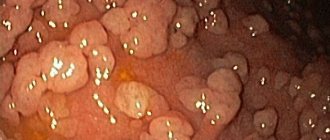Possible causes of a sweet taste in the mouth.
Most often, the appearance of a sweet taste in the mouth does not bother people as much as they associate it with eating sweets, cakes and baked goods. Yes, if you regularly eat a lot of sweets, you will likely experience a sweet taste in your mouth. If such a symptom does not disappear even on days when you do not eat sweets and cakes, then this is a reason to consult a doctor.
In most cases, quite serious pathologies that require immediate treatment manifest themselves in this way. In view of this, let's figure out what diseases can cause a sweet taste in the mouth and how you can quickly get rid of it.
What causes a sweet taste in the mouth during pregnancy?
Causes of a sweet taste in the mouth during pregnancy
The appearance of a sweet taste in the mouth during pregnancy can be caused by many different factors. Most often, the cause of this symptom in women in an interesting situation is banal overeating.
As practice shows, in the first months of pregnancy a woman begins to eat more than she needs, and most often the same foods. Such uncontrolled consumption of food leads to overload of the gastrointestinal tract and the appearance of pronounced sweetness in the oral cavity.
Other reasons for a sweet taste in the mouth during pregnancy:
- Hormonal background . During pregnancy, hormones sharply change their usual amount and this leads to a failure of metabolic processes. Against this background, the body begins to cope worse with the nutrients entering the body and, as a result, the woman begins to feel sweetness in her mouth.
- Deficiency of vitamins and minerals . As you know, during pregnancy a woman needs twice as many beneficial nutrients. If she does not consume the required amount of fruits and vegetables, then their level decreases to a minimum and the body begins to signal a problem with a similar symptom.
- Problems with the pancreas. Quite often in pregnant women, the pancreas stops coping with the load and begins to produce less of the enzyme necessary for normal digestion of food. This leads to a sharp decrease in insulin and a sweet taste in the mouth.
Dryness and sweet taste in the mouth: causes, treatment
Dryness and sweet taste in the mouth: causes, treatment
I would immediately like to clarify that the sweet taste that is accompanied by dryness is not always a sign of some kind of disease. Sometimes such symptoms appear due to banal dehydration of the body.
In this case, it will be enough for a person to establish a water balance and all unpleasant symptoms will disappear on their own. To do this, you just need to accustom yourself to drinking at least 1.5 liters of clean water per day.
Other causes of the problem:
- Diabetes. In this case, the human body will not produce insulin in normal quantities and because of this, the blood sugar level will increase. In addition, the patient will experience dry mouth, which will not go away even after drinking water.
- Pathologies of the endocrine system. This problem, in addition to sweetness and dry mouth, provokes severe hunger. As the pathology progresses, all symptoms will intensify and, as a result, a person’s hormonal levels will begin to fluctuate and metabolic processes in the body will begin to fail. All this, without proper treatment, will inevitably lead to the development of the same diabetes mellitus.
Recommendations for the treatment of pathologies:
- Diabetes. In this case, the first thing a person needs to do is establish proper nutrition. This means that he must adhere to a diet that will not overload the pancreas. In addition, medications that stimulate the production of insulin and medications that make cells more susceptible to this specific enzyme must be taken.
- Pathologies of the endocrine system. As a rule, this problem is eliminated by hormonal therapy, which is accompanied by the intake of vitamin and mineral complexes. All this helps the thyroid gland begin to work correctly and this leads to the disappearance of all unpleasant symptoms. But remember, hormonal pathologies require quite a long treatment. Therefore, if an endocrinologist prescribes you to take hormones for 6 months, then strictly follow all his instructions. If you interrupt treatment therapy or take medications irregularly, you will not get a positive result.
Bittersweet taste in the mouth: causes, treatment
Bittersweet taste in the mouth: causes, treatment
Problems with the bile ducts and gall bladder, or more precisely, cholecystitis and cholelithiasis can provoke the appearance of a bittersweet taste in the mouth. These diseases have almost the same etiology, so quite often they accompany each other.
If a person’s gallbladder and bile ducts become inflamed, this immediately affects the functioning of the digestive system. The patient will regularly experience diarrhea that will not respond to treatment. In addition, due to improper outflow of bile, the pancreas will stop working normally and, as a result, disruptions in metabolic processes will begin.
Treatment recommendations:
- Cholecystitis. To treat this pathology, medications are used that stimulate normal bile production. This could be Allochol or Cholenzym. In addition, the patient must be prescribed antibacterial therapy - Erythromycin and Tetracycline.
- Cholelithiasis. As a rule, cholelithiasis does not respond well to drug therapy. All that can be done in this case is to relieve pain during periods of exacerbation, and also regularly stimulate the motor activity of the ducts, for example, with sodium sulfate. If the problem worsens too much, the stones are removed surgically.
Diagnostic methods. What tests can be prescribed?
To undergo diagnostic measures and determine the cause of an unusual taste, you should initially consult a general practitioner or family doctor.
Based on the situation, the doctor may refer you for consultation to the following specialists:
- otolaryngologist;
- gastroenterologist;
- neurologist or neuropathologist;
- endocrinologist
A number of clinical studies include:
- glucose level test;
- general urine examination;
- general blood analysis.
Based on the results of general tests, doctors draw conclusions about the functioning of the body and identify sore spots. If disturbances in the functioning of the digestive tract are detected, then fibrogastroduodenoscopy is additionally prescribed, which gives an idea of the state of the gastrointestinal system.
Based on the results of a sugar test, one can judge about abnormalities in the functioning of the pancreas or metabolic processes.
The picture of the disease can be clarified using ultrasound of internal organs or fluoroscopy using a contrast agent.
Sweet-salty taste in the mouth: causes, treatment
Sweet-salty taste in the mouth: causes, treatment
Quite often, medications provoke a sweet-salty taste in the mouth, especially if they are taken for quite a long time. In view of this, if this symptom appeared to you after you began treatment for some disease, then be sure to tell your doctor about it, and make sure that the drug prescribed to you does not have a negative effect on your body. If the unpleasant symptom constantly intensifies, such treatment will have to be abandoned altogether.
Also, very often a sweet-salty taste in the mouth provokes inflammation in the nasopharynx. In this case, the cause of the unpleasant problem is a large accumulation of mucus. Due to the fact that it does not fit in the maxillary sinuses, it gradually begins to flow down the back wall of the throat. Some part of it gets on the tongue and the person begins to feel a not entirely pleasant taste.
Treatment of the problem:
- Take broad-spectrum antibacterial agents. You will need to take them for at least 7 days.
- Rinse your nose with saline solution every morning and evening. You can buy it at the pharmacy or prepare it at home from water and sea salt.
- If necessary, instill vasodilators into your nose to make breathing easier.
Prevention
There are many ways to prevent the occurrence of a sweet taste in the mouth. Doctors advise following certain recommendations to avoid diseases that lead to this symptom:
- It is necessary to monitor the health of the oral cavity, brush your teeth daily and consult a dentist in a timely manner for all people without exception, as well as rinse your mouth with special products or decoctions of chamomile and sage.
- The consumption of sugar, baked goods and other foods with easily digestible carbohydrates should be reduced to a minimum. You should add citrus fruits (oranges, lemons, grapefruits) to your diet.
- You should undergo preventive examinations from doctors and treat all emerging diseases in the early stages.
- It is imperative to maintain a sleep schedule, lead a healthy lifestyle and not forget about rest. This is necessary so that the nervous system can function fully and not fail.
- It is worth playing sports, since a sedentary lifestyle is the cause of many diseases and excess weight. It should be remembered that physical activity should be introduced gradually and it is important to take into account individual contraindications to some of them.
High carbohydrate foods increase blood sugar levels
Sweet and sour taste in the mouth: causes, treatment
Sweet and sour taste in the mouth: causes, treatment
The main reason for the appearance of a sweet and sour taste in the mouth is problems with the gastrointestinal tract, most often it is inflammation of the mucous membranes of the stomach and intestines. If such an inflammatory process is chronic, then a person develops gastritis and peptic ulcers. With the development of these pathologies and patients, a sharp increase in stomach acidity is observed, which becomes the cause of a not entirely pleasant problem.
Treatment recommendations:
- Take products that coat the mucous membranes and prevent them from becoming even more inflamed, for example, Almagel
- You will also need to undergo antibacterial therapy. To do this, take Amoxiclav or Furadozolin
- In addition, to normalize the condition, you will need to normalize the tone of the gastrointestinal tract tissues. This can be done with the help of antispasmodics No-shpa or Platyfillin.
Diagnostics
Establishing the correct diagnosis is carried out only by specialists, since a person may not even be aware of some pathologies. The basis of diagnostic measures are:
- a clinician’s examination of the patient’s medical history and life history to find out why the mouth tastes sweet;
- performing a thorough physical examination;
- conducting a detailed survey to determine if there are additional symptoms;
- General and biochemical analysis of blood and urine;
- microscopic examination of feces;
- carrying out specific tests to detect pathogens;
- Ultrasound and radiography;
- FGDS and biopsy;
- CT and MRI;
- diagnostic endoscopic procedures.
Carrying out FGDS
Sweet taste in the mouth: treatment with folk remedies
Sweet taste in the mouth: treatment with folk remedies
Anti-inflammatory decoction
- Take 1 tbsp. l chamomile and St. John's wort and pour 500 ml of boiling water over them
- Let the product brew, then strain and drink in 3 doses over the course of one day.
- Brew this tea every day and consume for at least 2 weeks.
- After this, you will need to take a break, and then undergo another course of treatment.
Bactericidal decoction
- Take 2 g of dry sage and calendula and fill them with boiled water (600 ml)
- Place everything in a steam bath and steam for 15 minutes
- Cool the product, strain it and divide it into 4 equal portions
- Consume it warm and always 30 minutes before meals.
- This product can also be used as a mouth rinse.
Treatment
The course of treatment depends on the diagnosis:
- Gastrointestinal disease - Rational nutrition, diet and lowering sugar levels are the first helpers. Selected nutrition is the basis for the treatment and prevention of gastrointestinal diseases.
- Nervous system disorders. The basis of treatment for this type of disorder is avoiding stress, rest, peace, and the use of sedatives.
Drug treatment
Getting rid of a sweet taste involves eliminating its cause.
It is irrational to remove only the symptom:
- Endocrine system disorders require the use of antidiuretic hormones
When gastrointestinal disorders are diagnosed, antibiotics (Amoxicillin, Metronidazole) and antacids (most often Maalox) are first prescribed;
- Endocrine system disorders require the use of antidiuretic hormones (Lipressin, Pitressin);
- The dentist prescribes the antibiotic Metronidazole during the sanitation;
- Inflammation of the upper respiratory tract, tonsils, and sinuses is treated with antibiotics (Sanorin, Furacilin).
Traditional methods
Traditional medicine involves treatment with herbs. However, most methods will only remove the symptom and will not have much effect on the gastrointestinal tract and endocrine system.
Tea for the stomach is well-known for use, however, such a collection of herbs will only help with parallel drug treatment:
- Calendula;
- Rose hip;
- St. John's wort;
- Mint;
- Sagebrush;
- Chamomile;
- Yarrow.
Dried herbs are poured with boiling water and left for about half an hour. The infusion is drunk three times a day. Duration of treatment is from two to four weeks.










